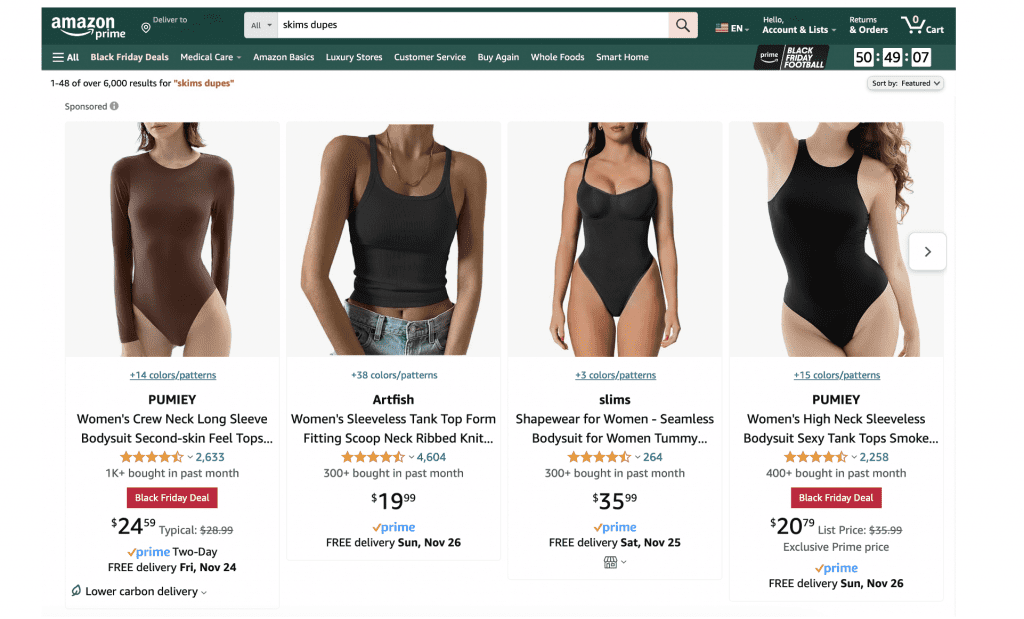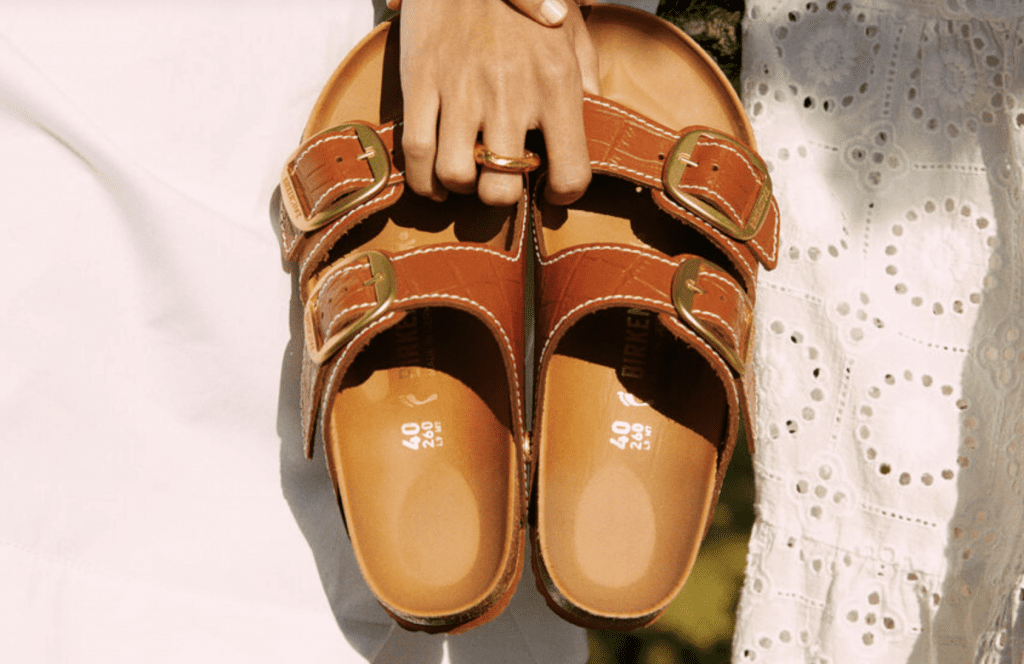Dupes are slated to capture an even bigger share of consumers’ spending this holiday, as economic uncertainty abounds and inflation (while slowing) continues to pinch. With the holiday shopping season under way, brands like Lululemon, Abercrombie & Fitch, Birkenstock, and Estee Lauder’s Tom Ford “are competing for shoppers and their growing love affair with TikTok-popularized ‘dupes’ – or sufficiently similar replicas of higher-priced products,” Reuters reported recently, noting that hashtag searches for dupes of major brands “have been viewed millions of times on TikTok” – and beyond.
Consumers are not merely browsing TikTok to uncover cheaper versions of designer wares, they are also actively seeking out product replicas on e-commerce platforms like Amazon, Etsy, and eBay. One need not look further than SKIMS to see that a notable number of consumers are seeking out lower-priced dupes for Kim Kardashian’s wildly-successful shapewear and loungewear line. Recent Amazon search trend data provided to TFL by Marketplace Pulse shows that in some cases, searches for Skims dupes have grown to overtake searches for authentic Skims products.
For example, during the week of November 5, consumers were searching for “Skims Dupe” (5.6 percent) on Amazon at a higher rate than “Skims” (3.79 percent). The same was true for “Skims Dress Dupe” (16.94 percent) versus “Skims Dress” (14 percent).
Delving into Dupes
While not a novel phenomenon, rising searches for “dupes” are an interesting phenomenon for a few reasons. Taking the cake from what were formerly known as “replicas” or “knockoffs,” dupes have experienced a surge of popularity in recent years thanks in large part to Gen Z and TikTok. As TFL first reported back in 2021, younger consumers were readily referring to counterfeit – or otherwise infringing – goods as “dupes.” In doing so, they co-opted a term previously reserved for goods that are inspired by existing products, but were, nonetheless, above-board from an intellectual property perspective, meaning that they did not make use of others’ trademark-protected branding, product and/or packaging trade dress, design patent-protected ornamental elements, etc.
The current terminology-of-choice seems to be a nod to the fact that the broader narrative has changed: Buying fake goods was previously something that consumers would keep quiet. Yet, it is becoming much more socially acceptable to have these copycat products, particularly among younger demographics – and to flaunt them on social media, as indicated by the feeds of “dupe” influencers. This shifting landscape – paired with the ever-rising prices of already-quite-expensive luxury goods – helps to explain part of why many consumers are simply bypassing searches for the “real thing” altogether in favor of seeking out dupes.

But more than that, attempts to secure dupe products seem to be a clear indication that consumers are not being tricked into inadvertently buying copycat products. Marketplace pulse founder Jouzas Kaziukènas says that the striking number of searches for things like “Skims Dupes” on Amazon suggests that “just like shoppers on Canal Street, [these] buyers on Amazon are not getting tricked into buying knockoff Skims products – they know and want cheaper lookalike copies.” He notes that Skims dupes are a particularly fascinating example, as “there are more people than want copies than the original goods.” This is demonstrated by the “very high” search frequency rank of 326 for “Skims Dupe” on Amazon’s marketplace.
Skims & Search Words
Skims is also an interesting example, as the 4-year-old brand does not stock its authentic wares on Amazon, which is likely part of what has driven – and will continue to fuel – the market for dupes on the e-commerce marketplace. Given that Amazon’s marketplace is “full of data driven sellers who can see [the demand for dupes] from Amazon search terms reports,” Kaziukènas states that sellers “have stepped in to fill [the] void” left by Skims. And since, in Skims’ case, the dupes generally do not make use of the company’s branding and/or legally-protected designs, they can be manufactured and sold without fear of infringement, which means that the dupe-sellers are not running afoul of the law. (Skims is something of an outlier in this sense largely due to the fact that the design aspects of shapewear garments, most of which have been done before, including by the likes of Spanx, are generally not protectable.)
For brands, the fact that Amazon produces search results that include product recommendations for competing goods and/or brands, including dupes (a search for “Skims Dupes” results in various bodysuits, under garments, and Skims-esque basics) “has to be super frustrating,” per Kaziukènas. He notes that the product listings “likely only have Skims as one of the keywords,” which almost certainly means that Amazon also is not in breach of the law either. Amazon, Google, etc. have prevailed in more than one case challenging its use of others’ trademarks as keywords to drive traffic to its site. In 2019, for example, a Western District of Washington court found that The Comphy Co. failed to demonstrate that Amazon’s use of the search term “comphy” to promote other companies’ sheets constituted trademark infringement.
An Unfeasible Fix
At least one brand seems to have found a solution to the problem of Amazon’s advertising practices. Business Insider reported earlier this month that Apple has secured a valuable deal for itself with Amazon, with which maintains an official partnership. It turns out that search results for Apple products directly sold by Amazon do not with ads or recommendations until the very bottom of the page. “Most other brands don’t get this special treatment.” In fact, Business Insider reports that “Amazon search results for other brands, such as Samsung and Sony, show at least two or three sponsored ads from rivals [before consumers reach the bottom of the search results page]; Amazon also shows a fewer number of search results for Apple’s products compared to its competitors.”
“The unusual arrangement follows the iPhone-maker’s private demands to Amazon to only show its products in results when an Apple term like ‘iPad’ is searched, according to an internal email previously shared by the House Judiciary Committee,” per BI. “At the time, Apple also asked Amazon to make its product pages clean, without any non-Apple product recommendations.”
So, what does this mean for other companies – like Skims – that are facing a surge in searches for dupes on Amazon? Probably not much. In light of enduring searches for dupes, Skims and other brands would certainly love a deal similar to the one that Apple currently enjoys – one that would see Amazon limiting the display of ads and copycat products in response to searches for “Skims” or “Skims dupes” instead of selling the keyword to the highest bidder. As for the likelihood of such a deal coming into fruition for the likes of Skims and other brands that do not maintain official partnerships with Amazon? Kaziukènas says the answer is simple, “Zero.”











